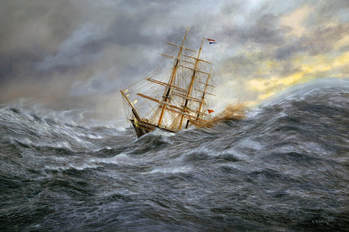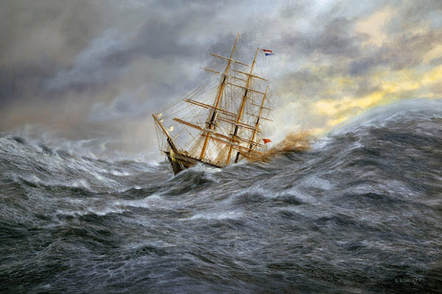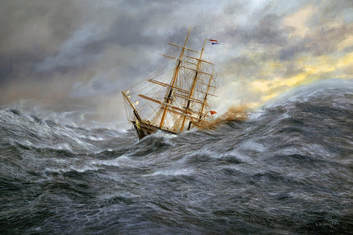|
Above, the deck was a shamble of rigging and pieces of the masts that were still attached to the hull and each other. They swayed and skittered and slid back and forth across the deck as the ship tossed in the heavy sea. Adam could see instantly that the waves were smaller and felt the wind abating from the peak of its fury. The question was, Adam ruefully asked himself, would the crippled Anson stay afloat or would it take its unshackled prisoners with it in a final plunge to the depths of the Atlantic.
The Africans had all made their way across the pitching, rain-swept deck to the captain’s cabin. The door had smashed itself to pieces at some time while he had been working below deck. Peering at Adam as he emerged from the hold were at least a dozen eyes, plastered against the two small windows or staring out through the splintered door. The last man, the singer, met Adam at the door. In the half minute it had taken to cross the deck, Adam had sketched out a simple, desperate, plan. As he reached the door the man reached out with his right hand and took Adam’s in a firm handshake. To Adam’s surprise he also grasped Adam’s right wrist with his left hand. The man nodded and touched his chest, “Irungu,” “Adam.” He gathered himself, pointed to a stay that flapped nearby but still was belayed tightly to the hull. Motioning for Irungu to follow he grasped the stay and made his way back across the deck to the amidships’ tools locker. “Come, Irungu, please!” Relieved, Adam felt the man follow him. He said a silent prayer at the locker and pried the heavy lid open. Four axes greeted him, nestled in their cradles in one end of the box. He pantomimed for Irungu using the axes to cut away the debris on deck. The African vigorously nodded understanding and turned immediately away from Adam, hanging onto the stay as another wave dashed the ship, struggling to the cabin. Adam watched him go, hoping against hope that Irungu had understood and not just given up. Irungu made it to the cabin door and spoke quickly, urgently above the howl of the wind. There was some jostling on the far side of the door and three men emerged, following Irungu back across the open space. When they arrived at the locker it was Irungu who motioned and spoke. The three men each grabbed an axe. Adam took the fourth and showed them quickly the use of the tool and tried to explain, also quickly, as another wave drenched them all to the waist, not to cut their lifeline ropes. They fell to their task with a will. Meanwhile Irungu had gone back to the cabin and brought 4 more men. Quickly, with Adam pointing, Irungu speaking, and the other seven swinging the axes and tossing overboard the massive remnants of the two masts, they cleared the decks. Once a man was hit by a wave and lost his grip on the safety line but Irungu managed to grab him before the water could sweep him away. Next Adam showed Irungu the tiller wheel and the idea of keeping the ship pointed into the waves. A tall, muscular man who identified himself as Kijani volunteered to man the wheel. Next they rigged a pair of small staysails to try and held keep the ship pointed into the wind and waves. Finally, Adam showed Irungu the main pump. In shifts, men and women energetically worked the pump from then through the long day and the following night. The storm weakened throughout the day, until only the overcast blotted the stars that night and finally Kijani relinquished the wheel. Adam and Irungu caught a few hours sleep after confirming the water in the hold was decreasing with the efforts of the entire crew. Dawn sought Adam’s eyes with the promise of a child on Christmas morning. He stretched his muscles slowly, luxuriously, in the warming, drying first rays of sunlight and carefully picked his way around other sleeping forms. On deck he opened the hatch to the rear hold and lowered himself carefully down the ladder into the darkness below. He was both reassured and grateful when only a small sloshing of water greeted him at the bottom of the hold. He felt along the racks where the barrels of biscuit and salt pork, pease and salt fish were stored. Intact. He carefully opened the nearest barrel of freshwater and tasted it. No worse than it had been before the storm. At least they would not immediately starve or die of thirst. The meal was one of great celebration with singing and improvised drumming and a rhythmic call and response. Adam was amazed at the culture and resilience of the “heathens”; he even heaved his tired bones up off the deck to join in the dancing and chanting. The next days were spent in a spurt of hard work and rudimentary training. Together they pumped the hold as dry as it ever had been since its maiden voyage. They rigged a sail on the stump of the foremast and another on the mizzen. They fashioned a kind of spritsail and, with practice, learned how to aid the steerage with deft changes to that sail. They also fashioned, as best they could, a course for return to Africa. Then they waited. The long days of clear weather and light winds and excruciatingly slow progress granted time for Adam to learn of the culture of the Kikuyu, for indeed all the Africans had been captured in a single raid from that tribe deep in the heart of Africa and sold, by stages, from one trader to another until finally reaching the coast and the waiting ship. He learned of their struggle and the wrenching of family members and death at the hands of one trader after another. And he gained a fuller comprehension of the soul of these people. Seventeen days after the storm they sighted a bird. The next day a matting of vines and branches that Irungu excitedly identified as land-based. Twenty days after the storm, as the sun began to set behind them, they sighted land. The long walk back to the lands of the Kikuyu still stretched in front of them, and many perils, but they had survived and for that they gave each other both credit and thanks.
0 Comments
“Come, Boy!” the captain called from the side of the whaleboat, “Time to cast off, whilst the trough is here!”
“I can’t let them drown in shackles!” “Boy! We’ve got no time fer this! To the boat!” But Adam was already making his way down the ladder and to the captain’s small cabin. “Fool! Cast off! All together!” and the whaleboat pitched expertly into the ocean on the lee of the Anson, oars biting in almost as the keel hit water. The next wave caught Adam as he reached the door. It took all his strength to hang onto the latch with both hands and thwart the roiling water once more. Once inside the eerie keening of the wind through the open door matched the surrealness of the calm air inside after ten hours in the gale. The desk where the shackles key was kept was locked but the desk key hung on a peg under the desk and it was nothing for Adam to unlock the desk and retrieve the key. The next wave caught him unprepared and he somersaulted through the small space to smash into the lee cabinets. Water swirled through the doorway and rushed back out as the ship pitched and rolled. Gasping for breath he righted himself and clawed his way to the opening. Snaring a stay whose deck end was still secure he slid across the deck to the hatch and then scurried down the ladder before the next wave dumped cold buckets on his head. He held onto the ladder and kept his feet but knew his task was hopeless. The water was already waist deep and he could feel the extra weight making the Anson even more sluggish. The Africans were each held by two irons, a leg iron attached to a ring in the keel and a wrist iron attached to a ring in a beam that crossed the hold from stem to stern about three feet from the hull. These beams essentially divided the hold into three sections, the outer two with the Africans huddled against the hull and a narrow central section where the crew could pass. Adam plunged under the cold water, grasping the first leg iron ring he could find and thrusting his key into the hole. Then another as the ship heeled in the next wave and he felt the rush of more water through the open hatch. Three, four then he had to surface to gasp for a lungful of air. Plunging under again as the ship lurched into the next wave. The Africans, terrified by the rising water and by the violent storm of which they could only hear and feel in the dark hold which, of itself, was totally foreign to all of them before their imprisonment three short days before, at first did not even realize Adam was in the hold. One by one a few began to realize their leg irons were loose and then noticed the oddly behaving figure in the center section. A single voice lifted in song. It was a full deep baritone and its first tones silenced the entire hold. The whimpering, crying, and frightened susurrations faded as everyone listed to the single voice. It told of hope and asked for patience; it gathered the shredded sanities of each prisoner back and handed them back to their owners with the equivalence of a chance. Adam, concentrating as he was amidst the pitching and the rising waters took two cycles of gasping and diving back under to realize the human sounds of the hold had changed. He did not understand the words but he instantly grasped the emotion. The song had a calming effect on him and he plunged into his task with less frenzy and more efficiency. The water had risen to chest high as he reached the end. The last African on the windward side was a woman, probably no more than twenty years old. Wild terror fought desperate hope in her eyes as Adam reached over and slipped the key in the lock for her wrist iron. It fell into the rising water as another great crack announced the splintering of the foremast. Adam motioned for the woman to pass him and head for the ladder as he slipped the key in the next lock, freeing a teenager whose nose was barely above the black water. Uncomprehending, the first woman did not move but the teenager, seizing Adam’s meaning, snatched the older woman’s hand and pulled her toward the ladder. Anson stuttered into the next wave but appeared to not roll as much and the torrent cascading through the open hatch was much reduced. As Adam worked the wrist locks the baritone’s song changed and became a sing-song round that Adam sensed was instructions to the hold for what to do when their irons were finally unlocked. He silently prayed they would instinctively know what to do once on deck. Finally, the water at chin level, Adam came to the man whose singing had been so helpful. He was stocky and short enough that he was struggling to keep his mouth above the sea but his song ended in a huge tooth-filled grin when Adam thrust the key into the lock. His first action was to wrap his rescuer in a joyous hug. The African then surged up the ladder with Adam pulling himself after. Adam Stevens hung on to the futtock shrouds for dear life as the grandly named Lord Anson was staggered by the next wave breaking over her starboard quarter. He was more frightened than he ever had in his seventeen years of hardscrabble life. The Atlantic gale had been battering the Anson for ten hours and now the boatswain reported they were taking on water.
The captain stood at the wheel, leaning into it with all his massive bulk, trying to keep the ship head on to the enormous waves. Adam had seen him relinquish his role only once since the storm began, to down a quick dram of rum and a slab of salt pork. His wide steady stance had been a marvel to the young man, not once knocked from his post despite the most massive of watery onslaughts. But for all of the captain’s stoicism the ocean would not be denied a victim in its tempest. A twisting gust of wind, stronger than any previous squall ripped through the Anson’s rigging and, with a report louder than any cannon-shot, snapped the mainmast quite in two. As it fell it slewed in a semi-circle snapping stays and halyards, braces and sheets. The crew abandoned the pumps and slid across the pitching, rain-lashed deck to grab axes to cut away the debris before the other masts joined their sister but the fatal damage was already done. With the sails in disarray the ship lurched into the wind despite the captain’s superhuman effort at the wheel. The bite of the rudder was no match for the gulp of the wind. The next wave caught them abeam and the ship canted at a 45 degree angle before slowly righting. The onrush of water caught one man without a grip and carried him with a fading anguished wail off the deck and into the dark waters beyond. A grate was torn loose and the angry water poured down into the hold in a triumphant cascade raising cries from the cargo below. Adam thought the captain was shouting something but his ears and eyes and mouth were full of water and all he could here was the roar of the gale, the ominous approach of the next wave and the terrified cries of the cargo. For Anson was a slaver and her cargo was ninety Africans bound for the plantations of Jamaica. In horror he watched as the next gust snapped the mizzentop and a yard crashed to the deck between himself and the captain. Where the captain seemed not to notice Adam flinched. The wave then followed with an even more terrible fury. It was all Adam could do to hang on to his perch, the sea hungrily sucking him toward the open ocean. Even the captain was staggered and pulled away from the stalwart wheel. The boatswain, hanging onto a halyard with one hand and the edge of the hold with the other shouted, “Two feet in th’ ‘old, Zur!” The captain nodded then cast about, taking in the mounting disaster about him. The foremast was bent, the stress of the splintered main creating a tension that would soon make it succumb in a like manner. The pumps, unmanned, as the crew struggled mightily to clear the debris even as the precariousness of their perches became more evident with the increased fury of the sea beam on. Finally he caught the whaleboat, still intact. He knew it would be much more manageable in the gale than the battered Anson, as long as the crew’s strength held. “Crew to the boat! Abandon ship!” The bellow cut below the fury of the storm and each crewman heard it as a rumble in his bones. As one they left axe and pump and made their way quickly toward the quarterdeck. “What of the Africans?” Adam cried to the captain who was working on loosening the lashings of the boat even as the next wave, fortunately smaller than its immediate predecessors, swept over the Anson. “God bless their heathen souls, Boy! No room for them here even if I wanted to save ‘em!” Adam closed his eyes. A remembered vision flooded his memory. Flames leaped up the side of the workhouse. Piteous cries from the women and children inside played a soprano tragedy above the tenor of the fire. Adam, ten years old, watched with tears streaming down his eyes screaming “Do something!” to the aged vicar who restrained him. The vicar offered a prayer for their souls. |
AuthorMe as a critic (be careful! the harshness will be well concealed!) Archives
April 2024
Categories
All
|



 RSS Feed
RSS Feed